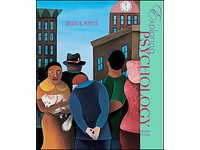Bestselling Books
|
Bestselling Books |
|
| US Bestsellers UK Bestsellers France - Meilleurs Ventes Canada Bestsellers Germany Bestsellers |
 Hooked on books? BestBooks.biz features book-related articles, book extracts and book selections from the best books - past and present.  Exploring Psychologyby David G. MyersThrough all the editions of this best-selling text, David Myers has guided millions of students through their introduction to psychology course. As always the author's thorough updating, exceptionally communicative writing style and integrated use of the SQ3R learning system (Survey, Question, Read, Rehearse, Review) make the text supremely engaging and accessible. A comprehensive supplements package is available to help both students and instructors. More information and prices from: Amazon.com - US dollars Amazon.co.uk - British pounds Amazon.ca - Canadian dollars Amazon.de - Euros Amazon.fr - Euros |
Introduction to Psychology
|
 Psychology: A Very Short Introductionby Gillian Butler, Freda McManusIn Psychology: A Very Short Introduction, Dr. Gillian Butler and Dr. Freda McManus provide an understanding of some of psychology's leading ideas and their practical relevance. The authors answer some of the most frequently asked questions about psychology including: What is psychology? How do we use what is in the mind? How does psychology work? How do we influence each other? What can or can't a psychologist do for you? Psychology is a large part of our everyday experience, and this elemental guide is a stimulating introduction for anyone interested in understanding the human mind. More information and prices from: Amazon.com - US dollars Amazon.ca - Canadian dollars Amazon.co.uk - British pounds Amazon.de - Euros Amazon.fr - Euros |
|
|
|
|
|
|
|
|
| Copyright © 2000-20l7 Alan Price and BestBooks.biz contributors. All rights reserved. |